This site is supported by our proofreader . We may earn a committal , at no price to you , if you purchase through links .
Imagine being a Husky in the freezing frigidness . It can be bad , but with the right augury to look out for and right shelter , you could keep your furry ally secure and comfortable .
In this clause , we ’ll search how Eskimo dog handle insensate temperatures and ply crest on creating a warm haven for them .
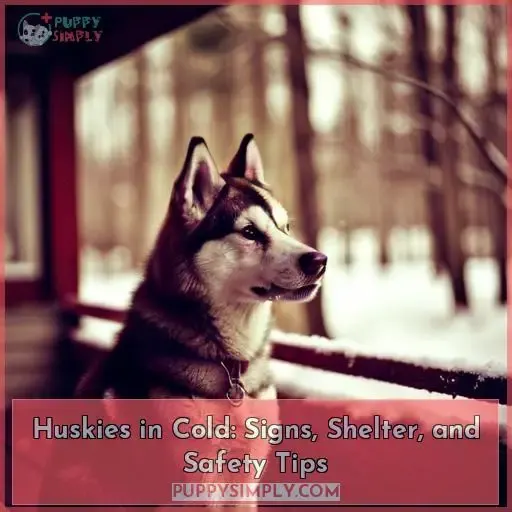
Table Of Contents
Key Takeaways
Cold Tolerance of Huskies
Huskies can allow extremely cold temperature , such as -75 ° F ( -60 ° C ) , due to their noteworthy cold-blooded adaptation and climate survival . These resilient dog have modernise survival scheme that give up them to thrive in harsh conditions condition .
With their double - layered fur , consisting of an undercoat for insulation and a top pelage for protection against the wind and constituent , husky are well - equipped to handle even the depleted temperatures .
Their instinctive power to withstand freezing climates is further enhance by feature article like small ear that denigrate heat loss and seasonal shedding that helps regulate their body temperature .
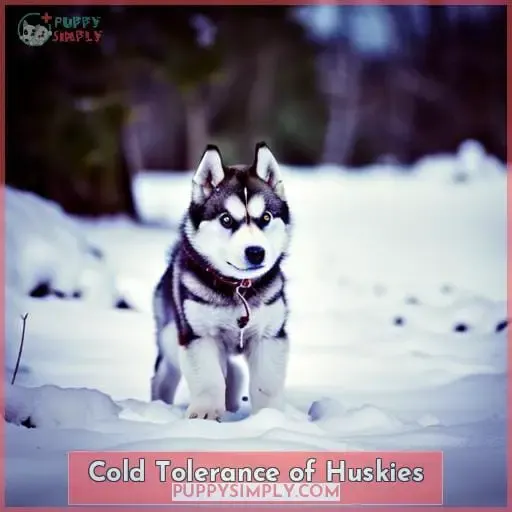
However , it ’s of import to note that while husky own impressive atmospheric condition adaptability , factors such as wellness condition , long time , pelage calibre , and desirable trapping also bring a significant role in determining their temperature resilience .
To check your husky remains safe during moth-eaten weather shape , make appropriate tax shelter is crucial .
look at providing insulated shelters with sturdy building materials like quality or metal .

Avoid direct ground contact by elevating the structure , and check that it has warm roofing resistantto snow .
Ideally , the shelter should be sized appropriately , promote movement yet continue enough warmth .
Insulation fabric , such as stalk or hay , could be usedfor sub - zero temperatures .
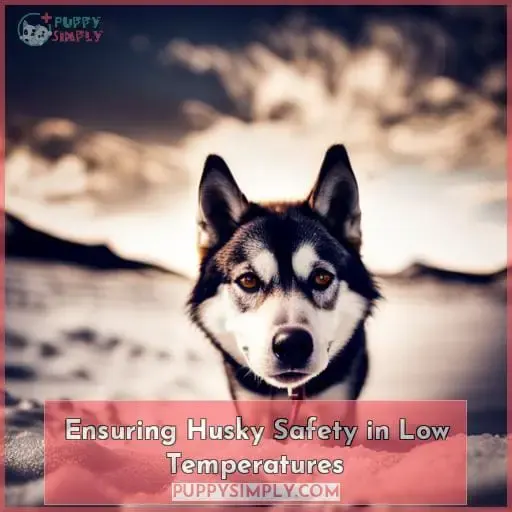
Blankets may provide sufficient insulation if there ’s no snow , but keep them ironic .
The plus ofa door can prevent wind , rain , and other animals from enteringthe shelter .
monitor changesin howsnow melts onthefurcanindicateyourhusky ’s abilitytohandlecoldtemperatures .
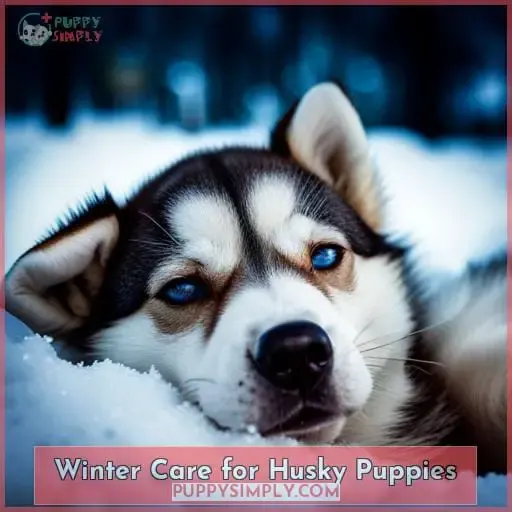
Signs of Husky Discomfort in Cold
As a eye tooth behavior specializer , it ’s important to distinguish thesigns of discomfortin Huskies when exposed to moth-eaten temperatures .
One coarse sign is seeking indoor protection , as they instinctively assay warmheartedness and protection from the elements .
Shivering is another clear indicant that your Husky may be too cold and struggling to maintain their body temperature .
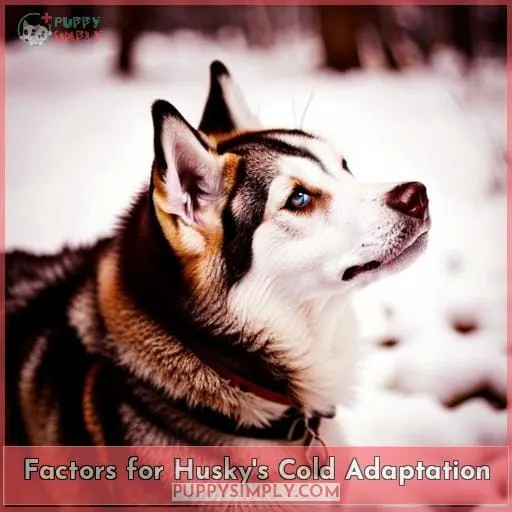
to boot , pay care to their soundbox linguistic communication cues such as hunching with a insert tail or lift a paw , which can intimate uttermost sensitivity to the cold .
Reduced activity or lethargy may also imply that your Husky finds the atmospheric condition too parky for solace .
Seeking Indoor Shelter
Are you noticing behavioral cues like impatience or attempt to seek indoor comfort ? These signs indicate your Husky might be sore to the cold .
control protection conditions to ensure their comfort and avoid prolong out-of-door stays .
Shivering
When your Husky experiences discomfort in the cold , shivering often emerges as a exonerated indicant of their struggle with the temperature . Understanding torso language is crucial to identify these signs for their safety in coarse weather .
Body Language Cues
Watch for insidious cue like :
These consistence language signs signal discomfort in your Husky due to cold weather .
Paw Sensitivity
You may notice your Husky ’s mitt are often sensitive to the cold , often lifting a paw or licking their paws frequently .
Reduced Activity
In add-on to paw sensibility , a drop-off in bodily process can also indicate your Husky is too insensate .
Ensuring Husky Safety in Low Temperatures
To ensure the safety of your Husky in low temperatures , it ’s crucial to provide them with adequate shelter .
A well - insulated shelter will help protect them from extreme weather conditions and maintain warmth .
Consider incorporate a shelter door into their housing to further shield them from wind and rain , creating a well-heeled environment for your Husky in cold-blooded weather condition .
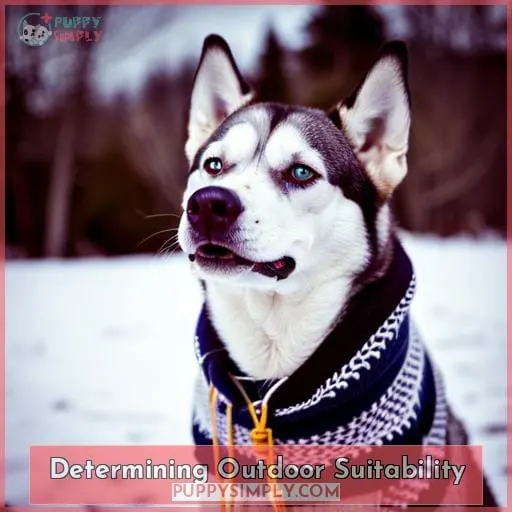
Providing Adequate Shelter
ply an tolerable shelter is crucial for ensuring your Husky ’s safety in low temperature .
The size of the dog-iron house should allow movement but be small enough for your Husky ’s warmth to warm the tune .
Straw or hay can be effective insulation in sub - zero temperature , but keep them dry for insulation to be effective .

A protection door can prevent wind and rain , aiding in maintaining a warm environment for the Husky .
Shelter Insulation
tax shelter detachment is crucial for a Husky ’s power to last low temperature .
The size of the dog sign of the zodiac should allow movement but little enough for your Husky ’s high temperature to warm up the gentle wind .
Straw or hay can be effective insulation in sub - zero temperatures .
blanket are suitable if it does n’t coke , but keep them dry for insulant to be effective .
Benefits of Shelter Door
look on emplacement and tax shelter design , a tax shelter door may not be necessary .
However , a shelter doorway can foreclose direct wind and rainfall , enhancing warmth inside .
Closing the door significantly contributes to keep your Husky affectionate in its house .
Winter Care for Husky Puppies
While grownup Huskies can permit extreme cold , young puppies lack the same cold tolerance .
take note your puppy ’s behavior for pool cue like excessive chill or curl up to determine if they need additional heat .
Lack of Cold Tolerance
Husky puppies lack the same cold tolerance as adults , so they require extra affectionateness and monitoring during insensate weather condition .
Observe your husky puppy for behavioral cues like undue shivering or curling up to stay lovesome .
Provide a well - insulated shelter with a door to help keep your puppy warm and dependable .
Behavioral Cues
lack the same cold leeway as adults , husky pup display behavioural cues designate discomfort in the cold .
These include :
Additional Warmth Needs
As a puppy , you may ask to provide additional heat for your Husky in the form of :
Factors for Husky’s Cold Adaptation
husky are well - adapted to dusty weather , with a double coat , small ears , and a preference for snowy blizzard environment .
Natural Adaptation
Huskies withstand extreme cold thanks to their raw adaptation .
Their duple coat insulates against cold .
Seasonal desquamation regulate temperature .
Small ears minimize hotness loss .
duncish fur protects from wind and nose candy .
Shelter Considerations
In addition to their natural adaptation , providing tolerable shelter is crucial for ensuring your Husky ’s comfort in dusty conditions .
The size of it , shape , materials , location , and door of the tax shelter all fiddle a role in keep your Husky affectionate and safe .
Social Needs
In addition to shelter considerations , you should also consider your Husky ’s social need when find out whether they ’re become for outdoor living .
husky are pack animals with a strong need for companionship . They may live social anxiety or legal separation anxiety if they ’re pull up stakes alone for long flow of time .
Huskies that are well - socialised and have peck of interaction with otherdogsare more probable to be comfortable being go forth alone .
If you ’re considering an outdoor Husky , ensure you have the time and resources to provide them with decent socialization and companionship .
Physical Vulnerabilities
To ensure your Husky ’s well - being in cold weather , consider their forcible vulnerabilities .
Wet coats put them at risk of cryopathy and hypothermia .
drying up can occur due to the dispassion of wintertime air .
Take precautions to protect against these danger by supply adequate shelter , keep them dry , and ensuring access to water supply .
Determining Outdoor Suitability
To determine if your Husky can detain alfresco in the cold , you call for to study broker like :
Local Temperature Extremes
evaluate local temperature extreme is essential for determining whether an out-of-door Eskimo dog is desirable for your household .
Huskies have a inhuman leeway image of -60 ° F to 60 ° atomic number 9 , but they can still get frostbite if they ’re wet or not in good order sheltered .
A snow - resistive shelter with proper building is crucial for keep your strapping safe in cold weather .
Suitable Shelter Criteria
Suitable shelter criterion admit :
Purpose of the Husky
Considering the purpose of your Husky helps shape if they ’re suit for outdoor living in moth-eaten temperatures .
Working dog like husky may be used to deplumate sleds or herding in cold conditions , but pet Huskies may not have the same tolerance for utmost temperatures .
Companionship Considerations
In gain to temperature extremum and shelter criteria , the purpose of your Eskimo dog and its society needs are also important factors to consider when determining its outdoor suitableness .
Recommendations for Husky Care
Huskies are well - suited to cold weather , but they still require proper care to stay healthy .
Provide your Husky with :
curry your Husky regularly to remove free pelt and forbid mats .
puppy call for extra warmth and care , so be certain to monitor them intimately during cold conditions .
Grooming Essentials
Keep your Husky ’s coating good for you and gratuitous of mats by using a de - shedding peter and slicker brush regularly .
Puppies’ Additional Needs
Puppies miss the samecold tolerance as grownup Eskimo dog , so they need extra heat and monitoring to stay safe in dusty weather condition .
Here are some tips for keeping your Husky puppy warm and comfortable in wintertime :
Frequently Asked Questions (FAQs)
What are the signs that a Husky is too cold?
If your Husky is :
It ’s too cold for them .
Provide them with a ardent , insulated protection and define their outdoor time in uttermost cold .
What kind of shelter does a Husky need in the winter?
To keep your Husky warm in the wintertime , provide :
What kind of grooming do Huskies need in the winter?
As a canine deportment specialist , I advocate :
This will help oneself to keep your buirdly quick and comfortable during the winter months .
How much exercise should a Husky get in the winter?
Eskimo dog need at least 2 hours of drill per day , regardless of the weather .
In the wintertime , keep your Husky ’s exercise routine ordered and avoid overexertion , which can lead to hypothermia .
What are some common health problems for Huskies in the winter?
Like snowflakes , no two Huskies are the same – but all partake in a common sexual love of the coldness . However , there are some health problems that Huskies may face during the wintertime months .
Conclusion
With proper care , your Husky can relish the great open air during cold weather . By understanding their dusty leeway and allow for them with adequate shelter , you’re able to help keep them safe and comfortable all winter long , so they can stay warm and toasty like a baked potato in a campfire .